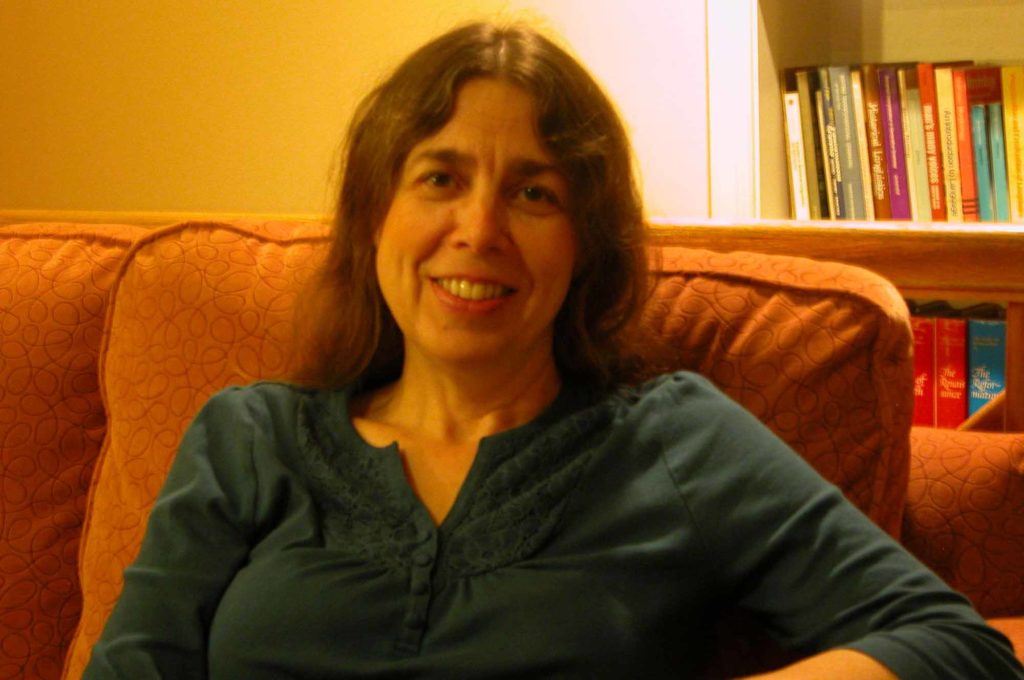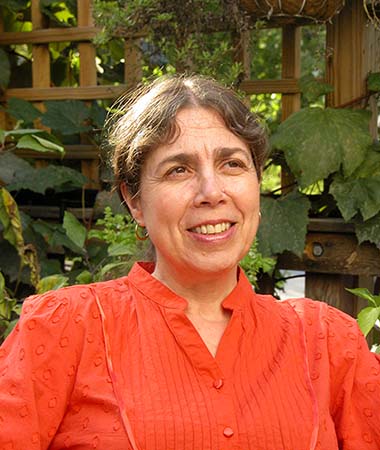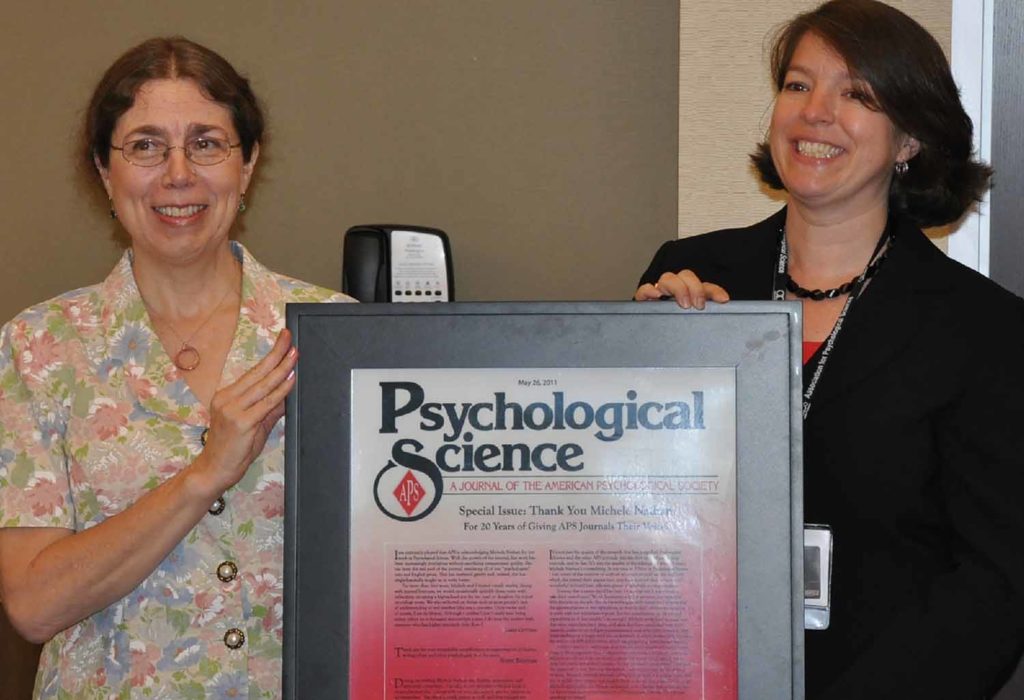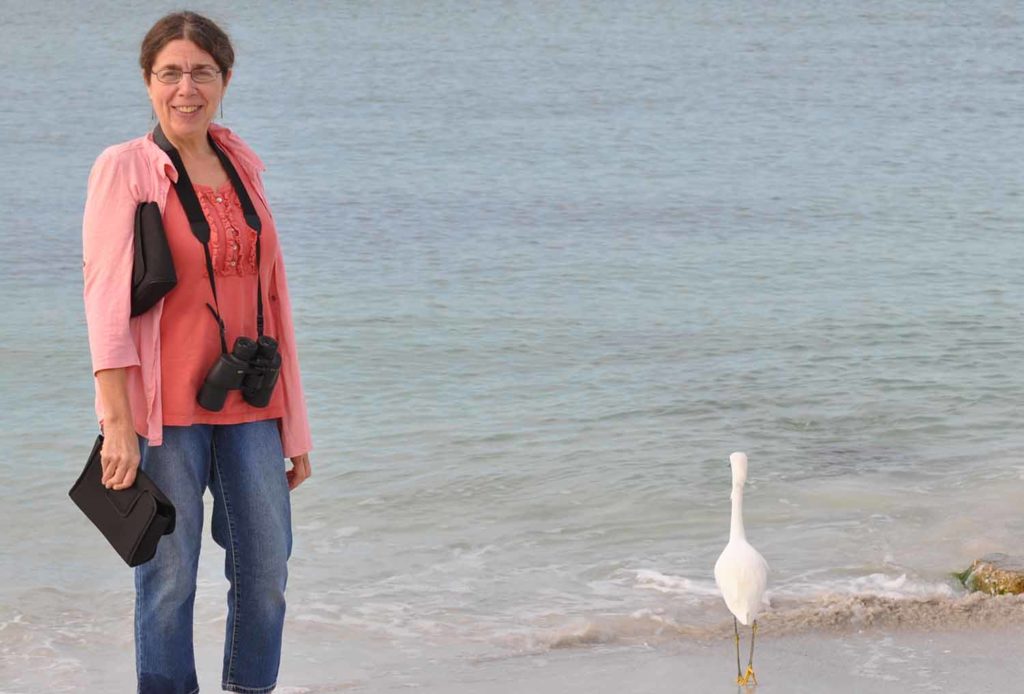APS Spotlight
Smooth Operator: The Editor Who Keeps the APS Journals Machine Flowing
A look back from APS journals’ longest-tenured managing editor

Image above: Michele Nathan, a “superstar” of the APS journals
She has collaborated with so many psychological scientists that her spouse, a respected writer whose work frequently brought him into contact with the social-science community, often enjoyed introducing himself in policy meetings or hearings on Capitol Hill simply as her husband.

She has helped eminent scholars and newly minted PhDs craft some of their most influential and accessible articles; many of these authors praise her as “a superstar” and “the ultimate professional with deep knowledge of her craft” and have found working with her to be “a wonderful, educational, and extremely humbling experience.”
She has kept the APS journals machine—one of the organization’s main engines for driving psychological science forward—well-oiled for the majority of APS’s 34-year existence, playing an often unseen but undeniably crucial role in the journals’ rapid rise to prominence and their persistence among the top journals in the field. And her PhD isn’t even in psychology.
Michele Nathan, the longest-tenured managing editor in the history of APS’s journals, is stepping away from this work in 2023. As two of her many longtime colleagues, we wanted to pay tribute to some of the ways in which her contributions have been so important to the science of psychology—and provide insights from her editing approach for the benefit of future generations of journal editors and authors.
Evolving together
The first issue of APS’s flagship journal, Psychological Science, was published in January 1990. From the outset, authors and editors endeavored to create a resource that was as valuable for the social and behavioral sciences as Science was at the time for the physical and biological sciences: a way to bring cutting-edge research across the many diverse fields in psychological science to researchers in those disciplines as well as to people completely outside of them. For this to happen, the material in the journal had to be not only compelling and influential but also digestible to readers who may not be experts in each article’s particular subject area. Enter Michele, APS’s first managing editor.
“For 30 years and through 30 volumes, Michele has been the constant flame and institutional memory of Psychological Science.” – John Kihlstrom, editor of Psychological Science, 1995–1999
“I have never seen anyone grasp an argument, and see the places where the words aren’t doing it justice, as well as Michele does.” – Susan Goldin-Meadow, Beardsley Ruml Distinguished Service Professor in Psychology and Committee on Human Development at The University of Chicago
“Michele is a superstar of clarity—detecting inconsistencies that we authors had never noticed. In the world of sports, she would certainly be inducted into the Hall of Fame and likely dominate the GOAT debate.” – David Loschelder, professor of business and social psychology and methods at Leuphana University Lüneburg in Germany
“When we got Michele’s comments on a paper already accepted for publication in Psychological Science, we were filled with a mixture of admiration and humiliation. We had never encountered such a level of attention to the text, such a feel for the music of the language, such a good grasp of what we really intended to convey. We feel lucky and honored to have had the opportunity to work with Michele.” – Yaakov Kareev and Judith Avrahami, professors at the Hebrew University of Jerusalem in Israel
“She improved my articles and I am sure she was able to do the same even for native English speakers. Michele is the ultimate professional, and that comes from deep knowledge of her craft and also from how much she cares about the science.” – Boaz Keysar, professor of psychology at The University of Chicago
“She made solid research papers that were almost unreadable into articles that could be quoted in The New York Times. I felt that Michele Nathan was the soul of the journal.” – James Cutting, editor of Psychological Science, 2003–2006
“I often felt like Michele understood what I was trying to say better than I did.” – Alan Kingstone, professor of psychology at The University of British Columbia
“In honoring the many contributions that Michele Nathan made to psychological science, I feel a bit like an athlete lauding one of their rivals. Michele didn’t edit my papers as much as go to battle with me. At first I found this back and forth to be frustrating, but eventually I looked forward to it, knowing that our shared commitment to excellence would lead to outstanding resolutions. In the end, Michele made me a better writer, and I will forever be grateful for her efforts!” – Adam Galinsky, Paul Calello professor of leadership and ethics at Columbia Business School
“For 20 years, I had the privilege of having Michele Nathan copyedit more than a dozen APS manuscripts. Not only were her editorial suggestions always technically correct, she also frequently added substantive clarity to the description of empirical findings. I have never worked with a more impressive managing editor or copyeditor.” – David Lubinski, Cornelius Vanderbilt Professor of Psychology at Vanderbilt University
“I came to know Michele through her precise and consistent copyediting of my papers published in Psychological Science. I valued Michele’s expert advice on those papers, so much so that I began to contact her on what seemed like an annual basis for wordsmithery and style questions that arose with my other papers. Your paper was always better after Michele’s input.” – Paul Quinn, Trustees’ Distinguished Professor of Psychological and Brain Sciences at the University of Delaware
“Her efforts transformed manuscripts so that published articles were clear and engaging for the entire readership. Over the years, editors, reviewers, and authors came and went, but Michele was always there, giving articles in Psychological Science a voice that was unique in the field.” – Rob Kail, editor of Psychological Science, 2007–2011
Michele began steering the production of APS journals the year after Psychological Science was founded. At first, the job required her to act as a one-person editorial office, substantively editing all the articles in collaboration with their authors and then personally coordinating production with the publisher and journal editors. As the APS journals suite expanded, the editorial office grew with it to include additional peer review and production staff, yet Michele always remained at the core of APS editing operations.
The path that led Michele to APS journals was not a direct one. After completing her PhD in anthropology at Tulane University, where she studied the language of the Seminole Tribe of Florida, she planned to teach anthropology, but a detour editing archaeological reports for a consulting firm led to a freelance editing job that enabled her to spend more time at home with her young son. But when APS’s publisher at the time, Cambridge University Press, handed the copyediting duties for APS journals over to APS itself, Michele was asked to take over the reins.
In the 30 years since, she has worked on all but one APS journal and has served as inaugural managing editor for Current Directions in Psychological Science, Psychological Science in the Public Interest (PSPI), Perspectives on Psychological Science, and Advances in Methods and Practices in Psychological Science (AMPPS). She has often worked on multiple APS journals at the same time, bouncing from the long, policy-focused white papers of PSPI to the highly accessible reviews found in Current Directions.
30-plus years of publishing change
Editing, when done well, is often invisible to the reader. Ideally, it should help an author’s message flow smoothly without making the text sound overly formal or formulaic. A good editor not only fixes small matters, such as typos and misplaced punctuation, but also considers the broader meaning of the work and suggests alternate phrasings to help authors clarify their message. The latter area naturally requires a more discerning eye, and authors have consistently praised Michele’s ability to help them distill complex technical material into tighter, more direct, and more easily digestible prose—crucially, without sacrificing scientific accuracy. As the scope of APS journals began expanding in more recent years to capture the increasingly global nature of psychological science research, Michele’s ability to find clear and idiomatic phrasings has been of particular value to authors who learned English as a second language.
As someone with a uniquely long view of scholarly publishing over the past 30-plus years, Michele has watched the industry change in ways both large and small. The most seismic changes have been technological: In the pre-internet days, she reflected, submitting, reviewing, and publishing manuscripts involved frequent visits to FedEx and the post office as manuscripts made the rounds from authors to editors to reviewers, back to authors for revision, and then back to editors and reviewers again. Only after an article was accepted for publication did it make its way—often via snail mail or fax—to Michele. Then the process of mailing, shipping, and/or faxing would begin anew as Michele edited (by hand) on printed manuscripts, which she then photocopied and mailed to the authors. She and the authors then sent drafts back and forth until all parties were satisfied and the final version was ready to send to the publisher for printing.

Technological advances brought online submission and production systems, which meant more frictionless transport of articles from review to publication. But even though communication time became quicker, “the migration from paper-and-pencil editing to editing on computer was initially hard to adapt to, in part because of the technology at the time,” Michele recalls. There were immediate upsides to technological advancement, however. Certain editing tasks—such as identifying articles cited in a manuscript but missing from the reference list or needing to familiarize oneself quickly with new terms or concepts—have been greatly facilitated by the ability to search within documents as well as the internet. Not to mention the savings on postage.
The digitization of publishing has had ripple effects in other areas as well—for instance, the increased emphasis on speed. “In recent years, there has been a trend in scientific publishing for fast turnaround and a corresponding lessening of attention to carefully worded exposition,” Michele notes. “It’s good for all of us in the world of scientific publishing to consider this balance from time to time and evaluate whether we need to recalibrate.”
The biggest trend that Michele has observed in the articles themselves is maximalism: Today’s articles are longer, have more authors listed in the byline, and are more likely to be accompanied by extra components, such as supplemental material and Open Practices badges, compared with articles published even 10 years ago. “It’s more than twice as hard to edit a long article with many figures and tables than to edit an article that is half the length and has half the figures and tables because there’s a lot more to watch out for in terms of consistency and organization,” she says. New requirements regarding methodological detail have resulted in longer and more complex articles, and the increase in the number and specializations of scholars can result in inconsistencies when different authors write different sections of a manuscript. These additional challenges make the consistency found within the pages of APS journals, from article to article, issue to issue—in style, in terminology, and, most important, in readability—all the more remarkable.
Learning from the science
Despite not being formally educated in psychology, Michele has gleaned a great deal from the thousands of pages of research she has helped to mold into accessible scientific articles. “I’ve learned a lot about psychology and statistics—more slowly than if I had taken courses, of course, but the content does sink in after a while!” Unsurprisingly, these findings often affected her personally, too: “My work on the journals gave me a lens through which to observe my own developing skill as an editor.” For example, research on phenomena such as working memory and chunking were relevant to Michele’s need to keep many details in mind in order to maintain consistency in a manuscript, and research on expertise and pattern recognition gave her a new perspective for evaluating how her own editorial skills developed over time. “Viewing myself as an object of study, in a sense, has added a layer of interest to my work.”
It might be natural to assume that Michele prefers to work with authors who are the most acquiescing to her edits, but that’s not the case. “My favorite authors to work with, regardless of the type of article they’ve written, are those who don’t accept every suggested edit but rather truly want to work collaboratively, sharing ideas so as to come up with the best solutions,” she reveals. “As an editor, I have my own version of the Hippocratic oath and am very concerned that I should ‘do no harm.’ In the end, the clearest, most consistent, and most readable articles result when authors and I each respect one another’s expertise and try to capitalize on the different views and skills we bring.”
Michele feels that the most rewarding aspects of her work include catching substantive errors that would otherwise make their way into the literature and solving thorny editing issues, such as finding the right wording to illuminate a tricky concept or determining the best way to organize a complex table. She has found AMPPS articles to be the most challenging to edit because of their highly technical nature, often requiring an understanding of sophisticated computer coding and advanced statistics. Current Directions, however, poses a different kind of challenge, “because it requires adopting the mind-set of a reader who has limited knowledge of psychology, neuroscience, statistics, etc., but is interested to learn,” she says.
From material that is comprehensible at the undergraduate level to articles that might require a grad school statistics course (or four) to understand, Michele has edited it all, and her long tenure has enabled her to collaborate with numerous authors on a wide array of articles spanning multiple APS journals. But authors may have wondered how Michele has felt about working with them: “One of many enjoyable aspects of my work,” she reveals, “has been building relationships with authors and editors over the years, despite never having met many of them in person.”
Parting words of wisdom
For authors looking for advice from one of the most experienced and respected editors in the field, “try to take a step back and be wary of implicit assumptions about what knowledge a reader brings to the article,” Michele advises. “It’s one thing to talk in a kind of shorthand with other members of one’s own lab, but will a reader who has a different specialty or who is reading the article a few years from now (e.g., when methods, equipment, or terminology have changed) be able to understand?”

Figures in particular, she offers, should be as clear and self-explanatory as possible. “Don’t assume that readers will know what’s intended by the distinction between solid and dashed arrows in a figure or that they’ll know what the unit of measure must have been. The beauty of figures and tables is that they can provide a great deal of information that’s easy to take in, but achieving this requires careful thought.”
Michele has left an indelible impression not only on APS journals but also on all of psychological science, a field she entered almost by chance more than 30 years ago. It is impossible to measure the true impact of her work—how many more readers the articles have reached because of her ability to make esoteric topics accessible, how many errors and misconceptions she has identified and enabled authors to correct before they became part of the scientific record, and how many researchers have communicated their ideas more effectively because of what they learned through the editing process. The words from the authors and editors with whom Michele has worked attest to the enormous influence that she has had on psychological scientists all over the world, for whom she has been an editor, a sage, a partner, and a guiding light of scientific communication.
Finally, correlation does not imply causation, as Michele would be quick to point out, but during her tenure, APS journals have published hugely influential work and have consistently been ranked among the top journals in the field. Although none of this would have been possible without the dedication of the researchers around the globe who conducted the studies, Michele’s role in shaping their manuscripts has placed her in the front rank of editors—an honorary psychological scientist and a true editing legend.
Tom Stafford, senior lecturer in the Department of Psychology at the University of Sheffield and an author of a recent article Michele edited, offers the best summary of her legacy: “If you multiply out the effect of Michele’s work over the decades, she will have played an immense and immeasurable role in helping improve the written record of psychological science, and so helping us all understand ourselves and each other a little better.”
Feedback on this article? Email apsobserver@psychologicalscience.org or login to comment. Interested in writing for us? Read our contributor guidelines.





APS regularly opens certain online articles for discussion on our website. Effective February 2021, you must be a logged-in APS member to post comments. By posting a comment, you agree to our Community Guidelines and the display of your profile information, including your name and affiliation. Any opinions, findings, conclusions, or recommendations present in article comments are those of the writers and do not necessarily reflect the views of APS or the article’s author. For more information, please see our Community Guidelines.
Please login with your APS account to comment.